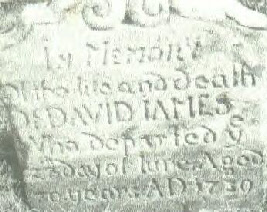
James Family Archives
• Researching the Past
• Education for the Present
• Preservation for the Future
In 1684, William Penn departed Pennsylvania and returned to England. The next four years, from 1684 to 1688, the Welsh Tract was left with no colony-wide government in existence. The lower courts met only a few days a year, and the county officials were private citizens who devoted very little time to upholding the law. The colony was, during this time, in a de facto condition of individual anarchism. Nevertheless, the colony seemed no worse for the experience. The Pennsylvania Assembly passed no new laws after 1686, as it was involved in a continuous wrangle over attempts to increase its powers and to amend, rather than just reject, legislation.
The year 1684 also saw the arrival of several individuals who would have a profound impact on the lives of David James and his family. In this year Stephan Ab Evan arrived in Radnor Township and settled lands just to the south of David. David’s brother-in-law Samuel Miles who had married his sister Margaret James as well as Samuel’s brother Richard Miles all arrived and settled in Radnor Township. To understand the history of David James and his family it is critically important to understand the relationships that developed between the families of David James, Samuel Miles, Richard Miles and David Meredith. These families would eventually intertwine through the marriage of their children and their common religious beliefs.
By 1687 Penn’s land commissioners had arranged for a second series of surveys to be conducted of the Welsh Tract. The land commissioners used this occasion to evaluate whether or not the settlers were making the best use of their land. For those settlers whom the land commissioners determined “were not” making best use of their land – their lands were literally taken from the original purchasers, sold and redistributed to those investors currently in favor with Penn. The impetus for this behavior was two fold: first, the land commissioners sought to make as equitable a distribution as possible of the lands originally granted by indenture prior to the arrival of the settlers in 1682; secondly, the land commissioners were compelled by Penn to satisfies the promises or “warrants” granted following his arrival in 1684. The last decade of the 1600’s saw a considerable shifting of land interests within the Welsh Tract, not always in the best interest of the settlers themselves.
One of those investors who found himself in favor with Penn’s land commissioners was a Quaker gentleman by the name of David Meredith. Mr. Meredith was born in 1637 and was originally from the parish of Llanbister in Radnorshire, Wales. He had become a follower of George Fox in his early years and was imprisoned in 1663 because he would not take the oath of allegiance to the Church of England. Thus David Meredith was a contemporary of David’s uncle David James who had also been bound under similar circumstances. Meredith would eventually settle in Plymouth Township, Pennsylvania. In Wales, Meredith had also been a successful businessman, a weaver by trade, and because of his sufferings was a prominent figure among the Quaker community. Prior to his arrival in Pennsylvania, David Meredith, like David James had purchased rights to 100 acres of land in the Welsh Tract sight unseen. However, upon his arrival in Pennsylvania he began investing his money and purchasing large swaths of land from Penn through his land commissioners for purposes of development. Among other holdings, Meredith would acquire up to 980 acres in the vicinity of Plymouth Township. Of particular interest to the history of David James is that on March 19, 1683 David Meredith was granted a “warrant”, that is a “promise” by William Penn’s land commissioners for an amount of land totaling five hundred and fifty acres within the Welsh Tract. The only problem with this particular “warrant” was that it failed to specify precisely where that land was to be located.